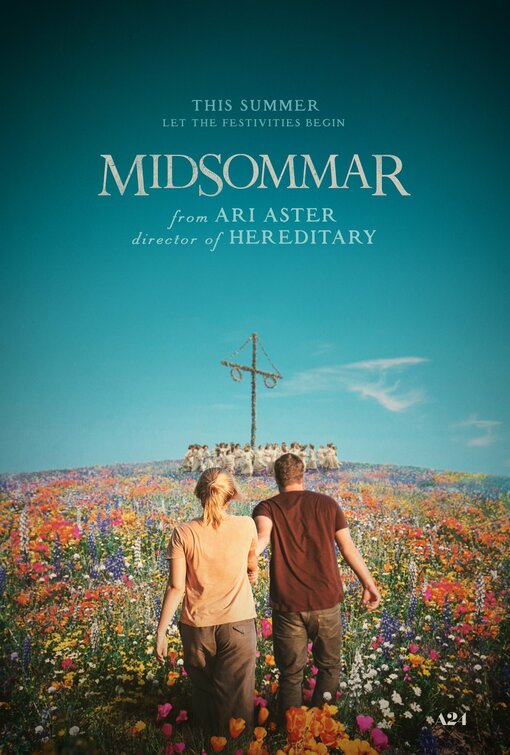by Chris Feil
 Ari Aster’s sunbleached hellscape MidSommar opens with a horrific tragedy, a shocking act that has nevertheless long been grimly foretold for Dani, a depressed collegiate played by Florence Pugh. What unfolds for her in the rest of the film feels as projected by the warning signs around her and as cataclysmic. No, not the ominous surroundings of her European countryside getaway. She’s in a relationship doomed to collapse.
Ari Aster’s sunbleached hellscape MidSommar opens with a horrific tragedy, a shocking act that has nevertheless long been grimly foretold for Dani, a depressed collegiate played by Florence Pugh. What unfolds for her in the rest of the film feels as projected by the warning signs around her and as cataclysmic. No, not the ominous surroundings of her European countryside getaway. She’s in a relationship doomed to collapse.
Though Dani’s imminent breakup with Christian (Jack Reynor) gets stalled by this horrible event, she suddenly finds herself slipping into his vacation plans with his begrudging friends. Promised a once-in-a-lifetime folk traditions in the isolated home village of one of his bros, the group descends upon the Hårga of Hälsingland looking to get a little stoned and enjoy some cultural tourism. Once there, Dani’s already established isolation in the group (and her relationship) intensifies from her grief and the increasingly strange rituals in which they participate. Lines are crossed early, but for reasons that feel insignificant in the end, they still stick around.

MidSommar crafts horrors in ways almost entirely unbeholden to how these kind of movies are supposed to behave. Instead of the hubristic tourist butchery by the likes of Hostel, Aster unsettles by infusing the setting with a pervasive sense of wrongness, burrowing the film under our skin rather than rattling our nerves. Again he favors the operatic, but produces something more contained in its eventual chaos than in his debut Hereditary. If Hereditary felt like intensive therapy, MidSommar is like a detox built on hallucinatory imagery and expressionistic terror. It’s simultaneously agonizing and euphoric.
Despite the steady dread, the film is rooted by a deeper sense of Aster’s darkly comedic scoundrel sensibility. There’s plenty of culture clash humor between the naive American’s and their monochromatically-disposed culty hosts, but the director finds great joy in exposing how stupid and self-absorbed we all are. Aster is very tongue-in-cheek about genre tropes here, presenting the kind of horror scenario that we seem only dumb enough to fall for in the movies but against a backdrop of the type of codependent union with which we’ve all had a dance around the maypole. Will Poulter gets comedy bonus points for curtly playing an insufferable (but correct) asshole, but Reynor’s work as a self-serving dope is a subtly (and, umm, not so subtly) physical stroke of understated comic brilliance.
The film is also not lacking for striking and originally grotesque imagery. As with Aster’s horror debut, the domestic scenes feel eerily stagey, but the opulent Hälsingland structures feel remarkably tactile in a way that grounds the absurdity in reality. It's a feat of design intensifying the themes, with both The Haxan Cloak's queasy score and the set design being especially immaculate. The film looks and breathes like a fairy tale emerging from toxic waste, aesthetically embodying a romance you try to will into being despite the threat barely contained on its surface.

But perhaps the most absorbing element in the film is the central performance by Pugh. Here again is Aster asking his leading performer to scale sudden emotional heights with a reserve of humanity, with Pugh delivering something to stand alongside von Trier heroines and scream queens alike. She turns Dani into a pathological pacifier, her physical attempts to sublimate herself as uncontrolled as her anxieties. It takes a smart performer to make Dani’s more frustrating faux-selfless actions instead reveal other shades of how she’s sold herself out. The film’s final cathartic, morbidly triumphant, and ruefully funny moments are brilliant thanks in large part to Pugh’s precise calibration of Dani’s emotional compass and physicality, a portrait of uncontainable grief.
Like its terrifying cult of linen-garbed Swedes, MidSommar is fascinated (you might say fixated) by the thought that life and love are forever on a renewing cycle. It’s about embracing endings and creating them, the punishment that comes with avoiding them. In showing Dani’s journey from from witness to participant, Aster paints bad relationships as an act of assimilation. Our willingness to overlook even the most obvious indicators of something being deeply wrong for misguided purposes is Aster’s tragicomic playground, making for a film that certainly won’t satisfy everyone, but is jarringly original nonetheless.
By the time MidSommar reaches its conclusion, our agonies are reflected back to us and Dani in ghastly symphony. Aster leaves the audience with a devilishly funny and despairing experience of mind, body, and spirit, both extreme in stylization and romantic honesty. Ultimately, our shitty relationships are really just cults of two.
Grade: A